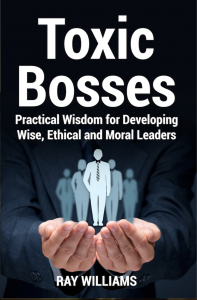By Ray Williams
May 29, 2021

Generally speaking, being in a bad mood isn’t just no fun, it also isn’t good for you — people who feel negative emotions like anger, anxiety and sadness a lot of the time tend to have poorer social lives and suffer worse physical health in the long run, suggesting that dark moods take a toll.
In earlier historical times, short spells of feeling sad or moody (known as mild dysphoria) have always been accepted as a normal part of everyday life. In fact, many of the greatest achievements of the human spirit deal with evoking, rehearsing and even cultivating negative feelings.
Greek tragedies exposed and trained audiences to accept and deal with the inevitable misfortune of human life. Shakespeare’s tragedies are classics because they echo this theme. And the works of many great artists such as Beethoven and Chopin in music, or Chekhov and Ibsen in literature explore the landscape of sadness, a theme long recognized as instructive and valuable.
Ancient philosophers also believed accepting bad moods is essential to living a full life. Even hedonist philosophers like Epicurus recognized living well involves exercising wise judgment, restraint and self-control and accepting inevitable adversity.
Other philosophers like the Stoics also highlighted the importance of learning to anticipate and accept misfortunes such as loss, sorrow or injustice.
Recent scientific experiments document the benefits of mild bad moods. These often work as automatic, unconscious alarm signals, promoting a more attentive and detailed thinking style. In other words, bad moods help us to be more attentive and focused in difficult situations.
These new scientific studies show that bad moods don’t have an adverse effect on everyone to the same degree. The crucial difference seems to be how much people see that there can be value, meaning and even satisfaction in bad moods — those who appreciate this tend to suffer fewer ill effects from the supposedly darker sides of their psyche.
Further, It is increasingly recognized that being in a good mood all the time, despite some advantages, is not universally desirable.
Intense and enduring sadness, such as depression, is obviously a serious and debilitating disorder. However, mild, temporary bad moods may serve an important and useful adaptive purpose, by helping us to cope with everyday challenges and difficult situations.
These moods also act as a social signal that communicates disengagement and withdrawal from competition and provides a protective cover. When we appear sad or in a bad mood, people often are concerned and are inclined to help.
Some negative moods, such as melancholia and nostalgia (a longing for the past), may even be pleasant and seem to provide useful information to guide future plans and motivation.
Sadness can also enhance empathy, compassion, connectedness and moral and aesthetic sensibility. And sadness has long been a trigger for artistic creativity.

Research Studies
Here are what recent research studies have concluded about bad moods:
- Embrace your bad moods and they won’t do you harm
In one study researchers interviewed 365 German participants about their attitudes to negative and positive emotions, and about their mental and physical health. The researchers then monitored the participants’ mood states over a three-week period using their smart phones. The links between people’s frequency of bad moods and negative outcomes (in terms of mental and physical health) varied depending on the attitudes they held toward negative emotion. Those participants who had negative attitudes toward bad moods tended to pay the usual price: the more negative moods they experienced, the poorer their mental and physical health, both in the moment and longer term (for example, based on their number of health complaints). However, among the participants who had a more positive attitude toward bad moods, these links were mostly reduced, or in some cases even absent completely. One caveat of this research: the research was conducted exclusively in Germany. Past research has already revealed cultural differences that are relevant to this topic — for example, German people are less motivated to avoid negative emotions than Americans, and some cultures are actually fearful of too much happiness — so we need more research to see if the current findings apply in other cultural contexts. - There’s a good chance you’ll feel better after having a proper cry
Giving yourself a chance to wallow in your sadness can sometimes be cathartic, at least in the short term. That was the message from a study published in 2011, in which 97 female undergrads completed a crying diary for between 40 and 73 days. Most often, mood after crying was reported as unchanged (60.8 per cent), but 30 per cent of tearful sessions were associated with a positive mood change, with only 8.8 per cent leading to a deterioration in mood. More intense (but not longer) crying episodes were associated with more positive mood outcomes, as were crying episodes that followed a feeling of inadequacy and that triggered a positive change in the situation. Also, crying in the company of one other person was associated more often with positive mood change than was crying alone or crying in the company of multiple people. - Being in a bad mood probably won’t affect your mental performance
For a study published this year, researchers had participants complete similar versions of the same mental tests for five consecutive days, including memory and processing speed. Each day before the tests, the participants also completed comprehensive measures of their mood. The participants’ mood and mental performance fluctuated over the course of the study, but crucially the two were not linked — in other words, there was no evidence that being in a bad mood was associated with performing more poorly on the mental tests. - You’re more persuasive when you’re sad
For this research released in 2007, participants were provoked into happy or sad moods by watching short films, either featuring comedy or a person dying from illness. Next, they had to write down arguments to persuade someone to change their mind about a controversial issue, such as student fees or Aboriginal land rights in Australia. Across several studies testing variants of this set up, sad people produced more effective messages than happy people, and what’s more, their arguments were more persuasive. The effect seemed to be due to the fact that sad people produced more concrete and specific arguments than happy people. - Feeling sad makes you less prone to misleading information
For research conducted in 2005, participants looked at pictures of a car crash. About an hour later, they recalled either happy or sad events from their lives, which had the effect of putting them in a happy or sad mood. Next, they answered questions about the car crash, some of which were misleading, such as “did you see the fireman holding a fire hose?” (in fact there was no fire hose). The key finding is that sad participants were less often mislead by this kind of false information than happy participants. The researchers said their results were consistent with other findings showing that “negative moods often promote a more accommodating, externally oriented and piecemeal information processing style that often results in more accurate and less distorted judgments and inferences.” - Bad moods can be motivating (when they’re followed by good moods)
A 2011 study that assessed software developers twice a day for 55 days found that the most engaged with their work in the afternoon were those who’d switched from a bad mood to a positive one, as compared with those who were happy all day or fed up all day. The finding is consistent with what’s known as the “affective shift model” of work engagement. “We think it is of benefit to understand and accept that negative mood and negative events, such as crises, conflicts, and errors, are integral and unavoidable aspects of human action at work,” the researchers said. “In the absence of negative experiences, people will perceive less necessity to act and show lower levels of work engagement.” - Mild depression may come with enhanced empathy
Depressed people are normally thought of as being somewhat disengaged from the rest of the world, but in 2005 psychologists at Queen’s University in Canada found that mildly depressed students actually had a heightened ability to detect other people’s emotions from photos that showed only the eye region of their face. Unfortunately, this “advantage” could backfire. The researchers said ultra sensitivity to other people’s emotions could cause problems for individuals prone to depression — “by being more sensitive, dysphoric and depressed individuals have more opportunities to deploy their negative biases in interpreting fleeting emotional reactions,” they said. - Sad leaders encourage an analytical thinking style
In this research from 2013, business students received task instructions and encouragement from a manager who spoke to them via video link. The wording of the leader’s guidance was the same for all students, but some of them watched the manager deliver his advice in a happy mood, while the others watched him while he was in a sad mood. After the video, those students who’d watched the happy manager excelled at a creative task (coming up with ideas of what you can do with a glass of water), but meanwhile the students who had the sad manager excelled at sudoku puzzles, used as a measure of analytical thinking. - You’re less gullible when you’re feeling down
Being sad also makes us less gullible and better at detecting lies, according to a study published in 2008. Participants were provoked into happy or sad moods by watching suitably themed films. Next, they watched videos of people lying or telling the truth about whether they’d stolen a movie ticket from someone’s room. The sad participants were more skeptical in general in their response to these videos, and they were better at detecting when the people in the videos were lying. “Our findings may also help to highlight the potentially beneficial effects of negative mood and the possible undesirable consequences of good mood in some circumstances,” the researchers said. “The cognitive benefits of negative affect can be understood in terms of the more accommodative, externally oriented processing style it induces,” they added. - Bad moods are part of a meaningful life
They say only a fool can be happy. That might be overstating it, but an American survey published in 2013 did find that people who rated their lives as more meaningful also tended to report experiencing more stress, anxiety and worry. The researchers, led by Roy Baumeister, concluded that the highly meaningful but relatively unhappy life has “received relatively little attention and even less respect” to date. “But people who sacrifice their personal pleasures in order to participate constructively in society may make substantial contributions,” they said. “Cultivating and encouraging such people despite their unhappiness could be a goal worthy of positive psychology.” - Repeatedly exposing yourself to a negative event may prevent it from affecting you: new research by Dr. Moshe Shay Ben-Haim, Yaniv Mama, Michal Icht, and Daniel Algom of Tel Aviv University’s School of Psychological Sciences now reveals that repeated exposure to a negative event neutralizes its effect on your mood and your thinking. The study, published in Attention, Perception, & Psychophysics, has broad implications for understanding our emotions. “A bad mood is known to slow cognition,” says Dr. Ben-Haim. “We show that, counterintuitively, you can avoid getting into a bad mood in the first place by dwelling on a negative event. If you look at the newspaper before you go to work and see a headline about a bombing or tragedy of some kind, it’s better to read the article all the way through and repeatedly expose yourself to the negative information. You will be freer to go on with your day in a better mood and without any negative effects.
- A bad mood may help your brain with everyday tasks: New research found that being in a bad mood can help some people’s executive functioning, such as their ability to focus attention, manage time and prioritize tasks.”Our results show that there are some people for whom a bad mood may actually hone the kind of thinking skills that are important for everyday life,” said McAuley. The high-reactive individuals — people who have rapid, intense, and enduring emotional responses — performed better on executive function tasks when experiencing a bad mood. Low-reactive individuals showed the opposite effect, with bad mood associated with worse executive functioning.
- This pattern of results supports the view that a bad mood may help with some executive skills — but only for people who are more emotionally reactive.Feeling sad or in a bad mood produces a number of benefits:
- better memory: in one study, a bad mood (caused by bad weather) resulted in people better remembering the details of a shop they just left. Bad mood can also improve eyewitness memories by reducing the effects of various distractions, such as irrelevant, false or misleading information.
- more accurate judgments: a mild bad mood also reduces some biases and distortions in how people form impressions. For instance, slightly sad judges formed more accurate and reliable impressions about others because they processed details more effectively. We found that bad moods also reduced gullibility and increased skepticism when evaluating urban myths and rumours, and even improved people’s ability to detect deceptionmore accurately. People in a mild bad mood are also less likely to rely on simplistic stereotypes.
- motivation: other experiments found that when happy and sad participants were asked to perform a difficult mental task, those in a bad mood tried harder and persevered more. They spent more time on the task, attempted more questions and produced more correct answers.
- better communication: the more attentive and detailed thinking style promoted by a bad mood can also improve communication. We found people in a sad mood used more effective persuasive arguments to convince others, were better at understanding ambiguous sentences and communicated better when talking.
- increased fairness: other experiments found that a mild bad mood caused people to pay greater attention to social expectations and norms, and they treated others less selfishly and more fairly.
- bettersuccess in school: A study published in Developmental Psychology by Erin Barker, professor of psychology in Concordia’s Faculty of Arts and Science, shows that students who were mostly happy during their four years of university but who alsoexperienced occasional negative moods had the highest GPAs at the time of graduation.
Managing Negative Emotions
The idea of “managing” negative emotions is a complex one. It doesn’t mean avoiding them — avoidance coping is actually a form of coping that attempts to do this, and it can often backfire. It also doesn’t mean letting these negative emotions wreak havoc on your life, your relationships, and your stress levels. Unmanaged anger, for example, can compel us to destroy relationships if we allow it to.
Managing negative emotions is more about embracing the fact that we are feeling them, determining why we are feeling this way, and allowing ourselves to receive the messages that they are sending us before we release them and move forward.
Yes, that statement may sound a little odd, but our emotions are definitely designed to be messengers to tell us something. These messages can be very valuable if we listen.
Managing negative emotions also means not allowing them to overrun us. We can keep them under control without denying that we are feeling them.
In a study of more than 1,300 adults, researchers found that people who regularly try to resist negative emotions may be more likely to experience symptoms of mood disorders months later, compared with subjects who accept such emotions.
Lead study author Brett Ford, an assistant professor of psychology at the University of Toronto in Canada, and colleagues recently reported their findings in the Journal of Personality and Social Psychology.
Previous research has suggested that acceptance — whether it is embracing our good and bad attributes, or accepting the way we look — is associated with better psychological well-being.
For this latest study, Prof. Ford and team sought to determine how acceptance of negative emotions — such as sadness, disappointment, and anger — might influence psychological health.
Embrace or avoid negative feelings?
To reach their findings, the researchers conducted three experiments, the first of which involved 1,003 participants. All subjects completed a survey, in which they were asked to rate how strongly they agreed with certain statements, such as “I tell myself I shouldn’t be feeling the way that I’m feeling.”
The researchers found that participants who had lower agreement with such statements as these — indicating a greater acceptance of negative feelings — showed higher levels of psychological well-being, compared with subjects who attempted to resist negative feelings.
In the second experiment — involving 156 participants — subjects were asked to record a 3-minute speech as part of a mock job application, which they were told would be shown to a panel of judges. The subjects were given 2 minutes to prepare their speech, and they were instructed to promote their relevant skills.
Once the recording was complete, each subject was asked to report how they felt about the task.
The team found that participants who tried to avoid feeling negativity about the task were more likely to experience distress, compared with subjects who embraced any negative feelings.
The third study involved 222 participants. For 2 weeks, each subject was asked to keep a journal to record any bad experiences, as well as their emotions in response to such experiences. Participants were followed-up with a psychological assessment 6 months later.
The researchers found that subjects who reported trying to avoid negative emotions in response to bad experiences were more likely to have symptoms of mood disorders, such as anxiety and depression, 6 months later, compared with those who embraced their negative emotions.
“We found that people who habitually accept their negative emotions experience fewer negative emotions, which adds up to better psychological health,” says senior study author Iris Mauss, an associate professor of psychology at the University of California, Berkeley.
In contrast, a positive mood (like feeling happy) typically serves as a signal indicating familiar and safe situations and results in a less detailed and attentive processing style.
Counteracting the cult of happiness
Feeling sad or in a bad mood helps us to focus better on the situation we find ourselves in, and so increases our ability to monitor and successfully respond to more demanding situations.
These findings suggest the unrelenting pursuit of happiness may often be self-defeating. A more balanced assessment of the costs and benefits of good and bad moods is long overdue.
Read my new book, available on Amazon:Toxic Bosses: Practical Wisdom for Developing Wise, Moral and Ethical Leaders,where I examine in detail the impact that toxic bosses have on employee well-being.


